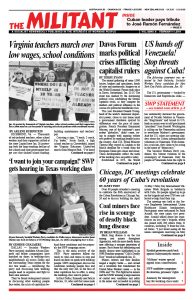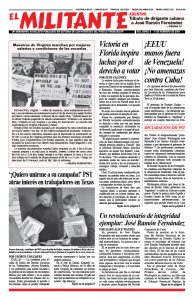“The main threat to peace and security in Latin America and the Caribbean is the harassment of the Bolivarian Republic of Venezuela by the U.S. government and its allies,” said Anayansi Rodríguez, the Cuban ambassador to the United Nations, during the U.N. Security Council meeting on the crisis in Venezuela held at U.S. request Jan. 26.
In a move orchestrated by Washington, opposition politician Juan Guaidó, head of the National Assembly, declared himself president of the country Jan. 23, claiming that Venezuelan President Nicolás Maduro had “usurped” power. The U.S. government — with a big measure of bipartisan support — immediately “recognized” Guaidó and stepped up measures against the Venezuelan government.
On Jan. 29 Washington blocked the Maduro government from access to Venezuela’s bank accounts in the U.S., along with those of the state-owned PDVSA oil company and revenue from PDVSA-owned Citgo — some $7 billion.
London is also aiding Washington’s blatant violation of Venezuela’s sovereignty. The Bank of England refused to comply with demands by the Maduro government to repatriate $1.2 billion in gold holdings.
The U.S. government is “disconnecting” the Maduro government “from the source of its revenues,” John Bolton, national security adviser for the Donald Trump administration, said Jan. 24.
Washington has enlisted the backing of the governments of 11 Latin American countries — Argentina, Brazil, Chile, Colombia, Costa Rica, Ecuador, Guatemala, Honduras, Panama, Paraguay and Peru — as well as Canada’s rulers. The governments of Germany, France and others in Europe have told Maduro to agree to new elections by Feb. 2 or they’ll join the U.S.-led campaign to replace him.
Carefully tutored by Washington, Guaidó is openly promoting a coup, calling on the military to oust Maduro and offering an amnesty for those who act “in favor of the restitution of democracy.”
In a Jan. 30 column “Venezuela’s Best Path to Democracy: Pay Off the Military,” the New York Times called for more “persuasive” U.S. government offers to guarantee the military’s control over highly lucrative businesses as the key to win its support. Under the government of late President Hugo Chávez and under Maduro, high-ranking officers have been given control of economic fiefs in the state-run oil company, ports, and mining.
The Times stated that while Venezuelan Defense Minister Vladimir Padrino López and the top military brass say they stand with Maduro, “behind closed doors, the military may be waiting for a better offer.”
Echoing U.S. government slanders, Guaidó claims that Cuban “operatives” control the Venezuelan military and should get out. This is a bald-faced lie. The top military brass there responds to what best serves the defense of capitalist property relations and their place in that. Up to now, that has been with Maduro.
A ‘third way’?
Maduro, like Chávez, has maintained a course that explicitly rejects the road taken by the Cuban Revolution — of organizing the working class to take political power. Instead, they have attempted to regulate the capitalist economy while using part of the oil profits to finance social programs.
The deepening crisis of capitalist production and trade today, along with the hostility and pressure from Washington and its allies, have intensified a growing economic and social crisis in Venezuela.
Annual inflation has reached a rate of more than 1 million percent. Shortages of food, medicine and other basic necessities are widespread, with devastating consequences for working people.
The Venezuelan government has depended on oil for 95 percent of its foreign currency. Even before the latest sanctions, the combination of the drop in oil prices over the last five years, along with a nearly 70 percent decline in production since 1998 — a result of bureaucratic mismanagement and corruption — had depleted government funds and devastated the industry.
Seeing no end to the crisis, some 3 million people have fled the country since 2015, including 1 million to Colombia, and hundreds of thousands to Peru, Ecuador, Argentina, Chile, and Brazil. Hundreds of thousands have also moved to the U.S. and Spain.
The U.S. rulers’ moves today are a bet that their long-standing policy to avoid the political cost of military intervention by letting the crisis eat away at support among working people for the Maduro government until it falls will now pay off.
Unlike previous rounds of opposition protests against the Maduro government, which have been centered among middle-class layers, there has been noticeable participation in recent protests from working-class neighborhoods.
Attempt to smear Cuban Revolution
Washington is also using the crisis in Venezuela to step up hostility toward revolutionary Cuba.
Soon after Chávez became president in 1998 amid mobilizations of workers and farmers in Venezuela, the Cuban government responded to his request to send thousands of internationalist volunteers, including health care workers, sports instructors and literacy teachers, to assist working people there.
In his speech to the Security Council, Secretary of State Michael Pompeo claimed that “no regime has done more to sustain the nightmarish conditions of the Venezuelan people than the regime in Havana.” He repeated the slander that “Cuban security and intelligence thugs … have sustained this illegitimate rule.”
Cuban Ambassador Rodríguez replied that the U.S. government is “deliberately lying and ignoring that the Bolivarian Republic of Venezuela is a free, independent and sovereign nation that makes its own decisions.” Cuba’s internationalist mission in solidarity with Venezuela, she said, is dedicated to providing life-essential services, above all in health and education.
The Trump administration is weighing stepped-up attacks on the Cuban Revolution. Since the passage of the Helms-Burton Act in 1996, every U.S. president has routinely suspended for six months at a time the Title III clause, which would allow U.S. citizens to sue companies that use property nationalized by the revolutionary government after it came to power in 1959. But in January Pompeo announced the suspension was being renewed for just 45 days this time and said continued extension is under review.
The Miami Herald reported Jan. 25 that the White House is also considering putting Cuba back on Washington’s list of “sponsors” of state terrorism.

